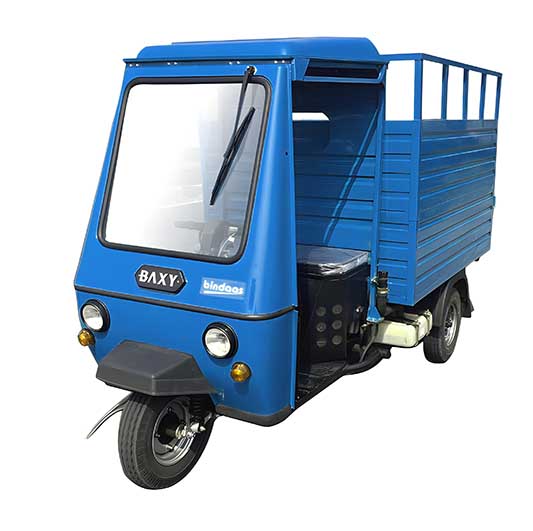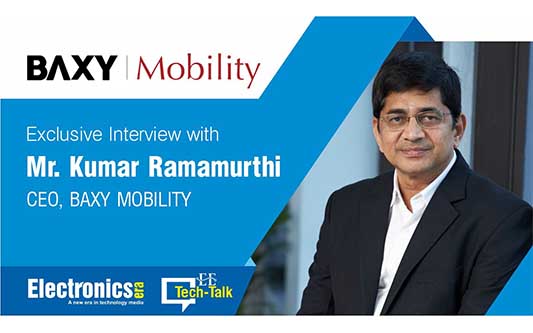EE: How Baxy Mobility helps in establishing a strong electro-mobility industry?
Mr. Kumar: BAXY Mobility is playing a pivotal role in establishing a strong electro-mobility industry by leveraging its expertise in advanced engineering and innovative design to develop reliable and efficient electric vehicles. By focusing on cutting-edge technology, sustainable manufacturing practices and a customer-centric approach, we are driving the transition towards cleaner transportation solutions. Moreover, we actively contribute to the growth of the electro-mobility ecosystem through strategic collaborations with battery and power train manufacturers, investment in R&D and fostering partnerships with channel and retail financiers that aim to build a comprehensive infrastructure for electric vehicles. BAXY Mobility is not only meeting the current demands of the market but is also anticipating future needs, thereby ensuring a resilient and dynamic electro-mobility industry.
- What strategies is BAXY Mobility implementing to overcome the challenges associated with the adoption of electric vehicles in India, and how is the company planning to scale its operations in the evolving electro-mobility landscape
BAXY Mobility is tackling the challenges of EV adoption in India through affordability, eco-system development and consumer education. We’re collaborating with partners to expand the charging network and investing in local production to reduce costs and strengthen the domestic supply chain. To scale operations, we’re diversifying our product range to meet the needs of both individual and commercial users and focusing on continuous innovation through R&D. This holistic approach positions BAXY Mobility as a leader in the evolving electro-mobility landscape in India.
EE: How BAXY Mobility taking charge of the EV Revolution in India and delivering sustainable solutions through engineering expertise, with a presence in eight countries?
Mr. Kumar: BAXY Mobility is at the forefront of the EV revolution in India, driving change through its engineering expertise and commitment to sustainable solutions. Our group having presence in eight countries, we leverages the global experience to innovate and deliver high-quality electric vehicles tailored to the unique needs of the Indian market. The company’s focus on advanced engineering, combined with sustainable manufacturing practices, ensures that their products not only meet but exceed industry standards for performance and efficiency.

- What are the key expectations that consumers have for 3 wheeler electric vehicle products?
- Affordable Price: Consumers expect electric three-wheelers to be competitively priced, especially compared to their traditional counterparts, given that price is a significant factor in purchase decisions.
- Low Operating Costs: The promise of reduced fuel and maintenance costs is a major draw. Consumers look for a clear cost advantage over time, making EVs a more economical choice.
- Complete Range: For both passenger and cargo three-wheelers, consumers expect wide range to complete daily routes without frequent recharging, minimizing downtime, thereby enhancing productivity.
- Reliable Charging Ecosystem: Easy access to fast and reliable charging stations is crucial. Consumers expect a growing network of charging points that are conveniently located, especially in urban areas, where three-wheelers operate in a major way.
- Government Incentives: Buyers anticipate ongoing government support in the form of subsidies, tax benefits and other incentives to offset the higher initial costs and support the transition to electric mobility.
- Performance and Durability: Consumers expect electric three-wheelers to match or exceed the performance of traditional models, with reliable acceleration, load capacity and durability to handle rigorous daily use.
- After-Sales Support: A strong network for maintenance and spare parts, along with responsive customer service, is expected to ensure smooth operation and quick resolution of any issues.
EE: Can you elaborate on BAXY Mobility’s long-term vision for the electric vehicle industry in India?
Mr. Kumar: At BAXY Mobility, we dream “To emerge amongst Top 5 Indian 3W manufacturers over the next 3 years”. This would call for significant change in our current ways of thinking and working. We have started to work on the building blocks such as – Market Rejuvenation, Quality Culture Transformation, Supply Chain Excellence and Capable & Competent Employees. These initiative would help us to attain – Competitive Cost, Consistent Quality, Confirmed Delivery, Complete Range and Compliant Operations, thereby satisfying our stakeholders. Some of our actions are detailed below.
Innovation and Technology Leadership: BAXY aims to lead in technology through application driven R&D, developing efficient battery systems, advanced telematics, and smart charging solutions, all tailored to India’s diverse conditions.
Sustainability: Committed to reducing carbon footprints, BAXY envisions its EVs significantly lowering greenhouse gas emissions and urban air pollution.
Market Reach and Accessibility: BAXY targets high-growth segments like last-mile delivery and public transport while expanding its dealer network and service infrastructure to reach a wider audience.
Partnerships: Strategic collaborations with battery manufacturers, technology providers, and charging infrastructure developers will be key to building a comprehensive EV ecosystem.
Customer-Centricity: BAXY offers tailored vehicle solutions for various segments and strong after-sales support to build customer trust and loyalty.
Scaling Production: Expanding manufacturing capabilities to meet growing demand.
Leadership in L5 Vehicles: BAXY aims for a strong presence in the L5 electric vehicle segment, focusing on B2B clients with top-tier performance and reliability.
Future-Ready Mobility: Exploring autonomous driving, connected vehicles, and new business models like vehicle-as-a-service (VaaS) and battery-as-a-service (BaaS).
Global Ambitions: BAXY plans to expand internationally, starting with emerging economies, while aligning with global standards for competitiveness.
EE: It is said that EVs are easier to assemble than conventional powertrain. as such we are looking various new entrants into the marketplace, especially Chinese or Indian OEM companies and they rapidly expand their presence in market, What would be key factors for companies that are thinking about taking initiatives in this changing marketplace under these new circumstances?

Mr. Kumar: To succeed in the competitive electric vehicle (EV) market, especially with the rapid expansion of Chinese and Indian OEMs, companies should focus on the key strategies, such as:
Product Differentiation: Develop unique features like advanced battery tech, superior range, or smart connectivity. Offer tailored vehicles for specific markets, such as urban delivery or luxury EVs.
Supply Chain Efficiency: Leverage local sourcing to cut costs and ensure regulatory compliance. Invest in scalable manufacturing to adapt quickly to market demand.
Strategic Partnerships: Collaborate with tech companies for innovations and with governments or utilities to support charging infrastructure.
Market Strategy: Enter regions with strong EV incentives and infrastructure, starting with a pilot market to refine offerings before broader expansion.
Regulatory Compliance: Stay ahead of local regulations and emphasize sustainability throughout the supply chain and manufacturing processes.
Customer Engagement: Educate consumers about EV benefits and build a strong after-sales network to ensure customer satisfaction and loyalty.
Financial Planning: Control costs to remain competitive and invest in R&D to stay ahead of technological advancements.
Brand Positioning: Create a strong brand identity focused on quality and innovation, using aggressive marketing to build awareness.
EE: Your thoughts on electric vehicle charging infrastructure and government incentives impact consumer adoption of electric vehicles?
Mr. Kumar: For three-wheelers, especially in emerging markets like India, the availability of EV charging infrastructure and targeted government incentives is vital for widespread adoption. Three-wheelers, commonly used for public transportation and goods delivery, benefit significantly from accessible, reliable and fast charging stations, especially in urban and semi-urban areas. Government incentives such as subsidies on EV purchases, lower GST and incentives for setting up charging stations can make electric three-wheelers a more attractive and cost-effective option. These measures not only reduce operating costs but also encourage fleet operators to switch to electric, contributing to cleaner and more sustainable urban mobility.
EE: What are the key market challenges for your organisation in India? What are your expansion plans?
Mr. Kumar: Intense Competition: The electric vehicle market is becoming increasingly crowded, with both established players and new entrants vying for market share. This competition puts pressure on pricing, innovation and customer acquisition strategies.
Regulatory Uncertainty: Navigating the evolving regulatory landscape, including state-specific policies and incentives for EVs, can be challenging.
Infrastructure Limitations: Despite growing interest in EVs, infrastructure, particularly charging stations, is still not well developed in many parts of India.
Consumer Awareness and Adoption: While awareness of EVs is increasing, there is still a significant portion of the market that is unfamiliar with or hesitant about transitioning from traditional internal combustion engine
Expansion Plans for BAXY Mobility:
We are continuously scanning both Indian and overseas markets, in order to strike a balance in our business portfolio. In this game, we plan to carry out the following.
Strengthening Presence in Key Markets: We plan to deepen our presence in regions with high EV adoption.
Infrastructure Development: We are actively exploring partnerships to expand charging infrastructure, both fixed and battery-swapping stations, to enhance the convenience and appeal of our EVs.
Product Line Diversification: BAXY Mobility is working on introducing new models in both the L5 cargo and passenger segments, tailored to meet the specific needs of various market segments. Our focus is to build Special Purpose Vehicles (SPV) to meet the evolving & growing cargo mobility needs. Further our R&D is also exploring semi to full luxury EVs, that could meet the discerning quality needs of urban customers. We would also offer both fixed and swapping battery options.
Hub & Spoke Model: Depending on market potential and need for customer centricity, we are working on hub & spoke model as part of “agile operations strategy” and exploring micro factories closer to demand centers.












